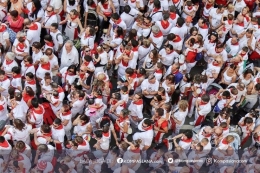By Fanny S. Alam
Coordinator of Bhinneka Nusantara Foundation Region Bandung
The inclining number of intolerance cases both in the levels of domestic and national has remained a number of questions, one of which is how the state of Indonesia with Pancasila and Bhinneka Tunggal Ika (Unity in Diversity) as the state's principles could experience the cases, predominantly in freedom of religions and beliefs as well as freedom of expression.
Back to history, a reflection towards the state's diversity values existence since the periods of Youth Pledge and pre-post independence is inevitable while at the same time presenting the interference of unity of diversity towards races, ethnicity, and religions in the state formation.
Therefore, it seems to be a huge confusion after 72 years of the state's independence to view why differences among races, ethnicity, religions now become a significant key as well as a high wall to be a restriction of various matters, such as education, public policies, for example regarding the building of other religions' worshipping houses, and politics.
It leads to various discrimnating and intolerant practices which will peak as bullying and violent actions conducted by majority groups of races, ethnicity, and religions to minority ones as well as to the ones within a difference of expression.
Intolerance As An Anomaly
The inclining number of intolerance cases in Indonesia presents a sharp anomaly along all the state's governance implementations nationally, unfortunately, the state's government from the central up to the lowest levels have not been considered strict to impose sanctions addressing the cases. As a consequence, each law violation associated with intolerance cases, predominantly in freedom of religions and beliefs as well freedom of expression effortlessly occurs through the society provocation against minority groups subsequently.
By the rank, West Java is considered the highest in conducting intolerance cases. Confirmed by Wahid Foundation, most intolerance cases emerging in the province have accomplished the toppest level, such as the rejection of St. Clara Church in Bekasi, the status quo determination towards 3 churches in Parung Panjang in the regency of Bogor due to the pressure of intolerant groups with the reason to maintain the area conduciveness, and the restriction as well as the enjoinment of Jemaat Ahmadiyah Indonesia's activities in Depok.
The latest is the suicide bomb in 3 churches in Surabaya on May 13, 2018 followed by some attacks to police headquarters in some main cities in Indonesia which later on question the government's serious willingness to finalize the revision of Act of Anti Terrorism.
Tolerance As A National Civilization
The change of the world order following globalization promotes a fast immense exchange of information accompanied with a significant shift of values in the world societies broadly. The shift involves supporting factors, such as religions, ethnicity, races, culture, economy, and politic which eventually trigger potent conflicts among the world societies. To put a response on this issue requires open minded behaviour through intensive communication among the world's leaders, religions preachers, and the societies in grassroots.
Unfortunately, at the same time a question of why human rights values decline as a consequence of the potent conflicts mentioned above emerges around the globe. Particularly in Indonesia, the question is on an intense debate, noticing that most potent conflicts with the above-mentioned factors have profoundly involved Indonesian societies in grassroots provoked by political actors and religions preachers.
Julien Hoffmann' s writing "We have no right to force our religion on others" citated by Wendy Brown underlines that tolerance is an integral part of the modern world order. It is furthermore elaborated as a significant part of human history development as well as national civilization across the globe. It is indicated by the appearance of law-based regulations, democracy, and freedom as well as independence.
Defined as a willingness to accept differences of other ways of thinking, behaviours, and values of beliefs despite personal disapprovals towards those differences, tolerance is a value to improve wise open-minded ways of thinking and acting due to facing globalization in a multi-dimension country. Indonesia, as an example for this issue, has maintained tolerance values through Pancasila as a part of universal values for the state's societies.
Furthermore, Pancasila is an improvement of deliberation and consensus concepts in terms of an institutional development in the side of organizations and a managerial development in the state's governance implementations according to Prof Dr. Pyofr Hessling of Erasmus Rotterdam University.
The values of Pancasila are supposed to be generated to Indonesian future generations, mostly through education so as to build the national and self personality while maintaining open-minded and respectful attitudes on account of emerging differences from their environment and a bigger scale one. Pancasila is the life principle embracing different interests which rely on religions, races, and ethnicity as well as the formation of national civilization to promote the state's diversity values.
In purpose to reduce potent conflicts due to the differences through the use of Pancasila values, the Indonesian government along with the societies and political actors should develop their deep awareness of minority groups existence in their proven vulnerability to experience intolerance and discrimnating practIces.
Their awareness will encourage a political interest to represent minority groups, meanwhile in a term of identity politics, perspectives of tolerance can be applied in order to accommodate various diverse preferences and they can be represented through the government's public policies in order to reduce the enforcing of any majority's interest towards other parts of the societies' differences.
The Indonesian government along with their apparatus as well as the state's laws and regulations must be able to develop perspectives of tolerance towards diverse circumstances in the country so as to embrace minorities yet marginalized groups and this is what is called Indonesia with tolerance as a part of national civilization for now and future period.
Baca konten-konten menarik Kompasiana langsung dari smartphone kamu. Follow channel WhatsApp Kompasiana sekarang di sini: https://whatsapp.com/channel/0029VaYjYaL4Spk7WflFYJ2H







